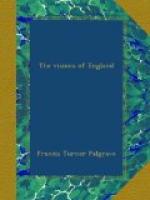Her passing-bell as from earth they go up, her imperial souls?
—He rests:—’Tis a lion-sleep: and the sternness of Truth is reproved:
The sleep of a leader of men; unhuman, to watch him unmoved!
In the stillness of pity and awe we remember his troublesome years,
For man is the magnet to man, and mortal failure has tears.
—He rests:—On the massive brows, as a rock by the sunrise is crown’d,
His passionate love for the land, in a glory-coronal bound!
And Mercy dawns fast o’er the dead, from the bier as we turn and depart,
England for England’s sake clasp’d firm as a child to his heart.
—He rests:—And the storm-clouds have fled, and the sunshine of Nature
repress’d
Breaks o’er the realm in smiles, and the land again has her rest.
He rests: the great spirit is hid where from heaven the veil is unroll’d,
And justice merges in love, and the dross is purged from the gold.
The general point of view from which this subject is here approached is given in the following passages:—’The whole nation,’ says Macaulay (1659), ’was sick of government by the sword, and pined for government by the law.’ Hence, when Charles landed, ’the cliffs of Dover were covered by thousands of gazers, among whom scarcely one could be found who was not weeping with delight . . . Every where flags were flying, bells and music sounding, wine and ale flowing in rivers to the health of him whose return was the return of peace, of law, and of freedom.’ Nor was this astonishing: the name of the Commonwealth, a greater than Macaulay remarks, ’was grown infinitely odious: it was associated with the tyranny of ten years, the selfish rapacity of the Rump, the hypocritical despotism of Cromwell, the arbitrary sequestrations of committee-men, the iniquitous decimations of military prefects, the sale of British citizens for slavery in the West Indies, the blood of some shed on the scaffold without legal trial, . . . the persecution of the Anglican Church, the bacchanalian rant of sectaries, the morose preciseness of puritans . . . It is universally acknowledged that no measure was ever more national, or has ever produced more testimonies of public approbation, than the restoration of Charles II. . . . For the late government, whether under the parliament or the protector, had never obtained the sanction of popular consent, nor could have subsisted for a day without the support of the army. The King’s return seemed to the people the harbinger of a real liberty, instead of that bastard Commonwealth which had insulted them with its name’ (Hallam: Const. Hist. ch. x and xi).
Peace in her car; It will be seen that the Rospigliosi Aurora, Guido’s one inspired work, has been here before the writer’s memory.
On thyself thrice turn; The civil wars of the Barons, the Roses, and the Commonwealth.




